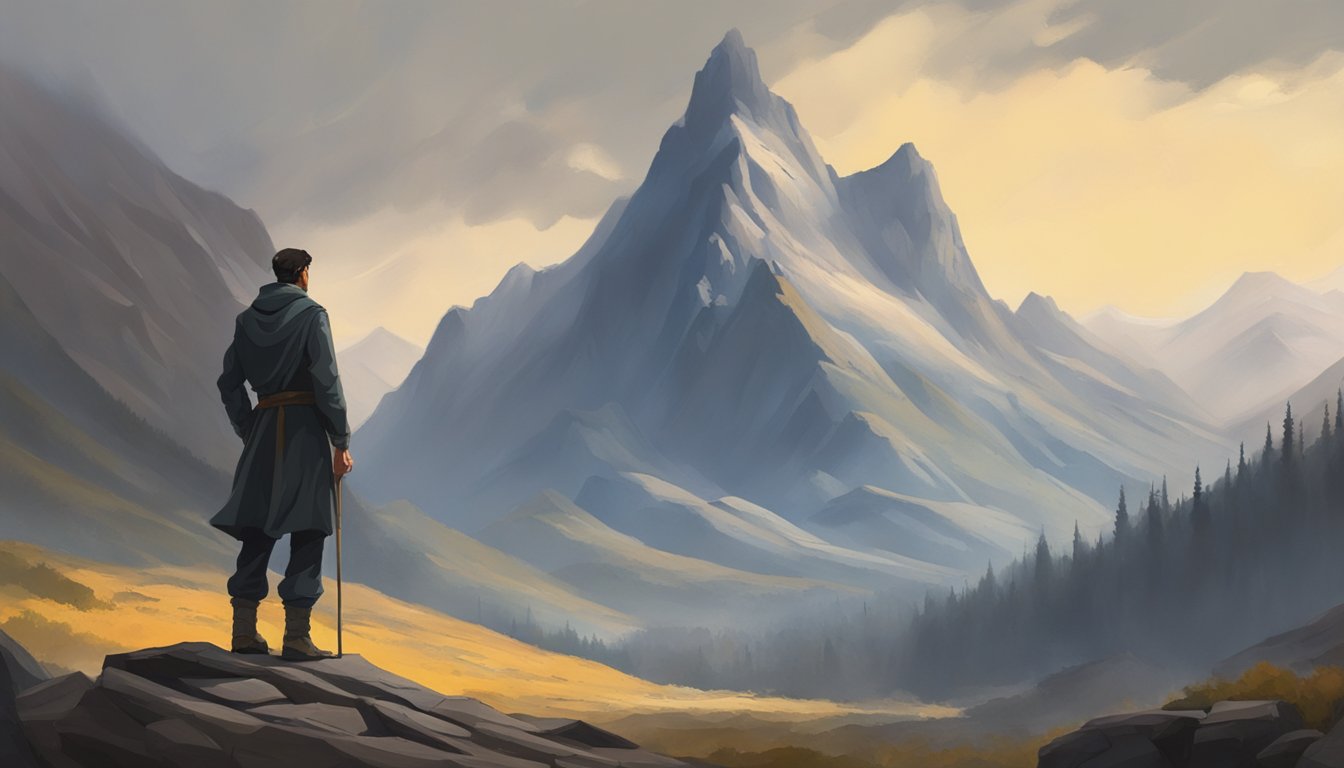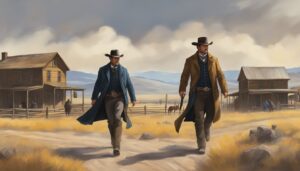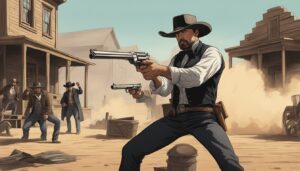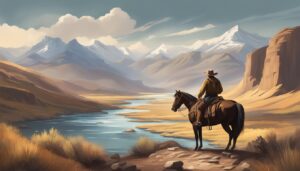Western heroes have captivated audiences for generations, embodying courage, grit, and a code of honor. Two iconic figures stand out in this tradition: John Dutton from the modern TV series Yellowstone and Chris Adams from the classic film The Magnificent Seven. Both characters represent different eras and archetypes of the Western genre.
John Dutton, portrayed by Kevin Costner, is a complex rancher fighting to preserve his family’s legacy in contemporary Montana. He faces modern challenges like land developers and corrupt politicians while adhering to traditional values. Chris Adams, played by Yul Brynner in the 1960 film, is a gunslinger who leads a group of mercenaries to defend a Mexican village from bandits.
While both John Dutton and Chris Adams are impressive in their own right, John Dutton’s character depth and ability to navigate the complexities of the modern world make him a more nuanced and relevant Western hero for today’s audiences. Dutton’s struggles with family dynamics, ethical dilemmas, and the changing landscape of the American West offer a fresh take on the classic Western protagonist. His character explores the evolution of the Western hero in a world where the lines between right and wrong are increasingly blurred.
Comparative Analysis of Characters

John Dutton and Chris Adams are iconic Western figures who embody different aspects of frontier heroism. Their contrasting backgrounds, motivations, and leadership styles offer a fascinating study in character depth and complexity.
John Dutton: A Detailed Profile
John Dutton is the patriarch of the Dutton family and owner of the largest contiguous ranch in the United States. His character is defined by unwavering determination to preserve his family’s legacy and land.
Dutton’s moral compass often blurs the lines between right and wrong. He employs ruthless tactics to protect his interests, yet demonstrates fierce loyalty to his family and ranch hands.
As a leader, Dutton commands respect through a combination of intimidation and paternal guidance. His complex relationships with his children reveal a softer side beneath his tough exterior.
Dutton’s character evolves throughout the series, facing challenges that test his resolve and force him to adapt his strategies to maintain control of his empire.
Chris Adams: A Detailed Profile
Chris Adams, portrayed by Yul Brynner in “The Magnificent Seven,” is a professional gunslinger turned reluctant hero. His character embodies the classic Western archetype of a lone wolf with a strong moral code.
Adams’ leadership skills shine as he assembles and leads a team of gunslingers to protect a Mexican village from bandits. His calm demeanor and tactical prowess make him a formidable force in combat situations.
Unlike Dutton, Adams lacks familial ties, which allows him greater personal freedom but also leaves him somewhat emotionally detached. His motivations stem from a sense of justice rather than preserving a legacy.
Adams’ character growth is evident as he transitions from a mercenary mindset to genuinely caring for the villagers he protects. This transformation adds depth to his initially stoic persona.
Actor Portrayals and Performances

Kevin Costner and Yul Brynner bring gravitas to their iconic Western roles. Their performances shape how audiences perceive John Dutton and Chris Adams as formidable heroes.
Kevin Costner as John Dutton
Kevin Costner’s portrayal of John Dutton in Yellowstone has captivated audiences on Paramount Network. His nuanced performance brings depth to the complex ranch patriarch. Costner’s extensive experience in Westerns lends authenticity to his character.
The actor’s commanding presence and subtle expressions effectively convey Dutton’s inner struggles. His chemistry with the ensemble cast elevates the show’s family dynamics. Costner’s John Dutton embodies the modern cowboy ethos, balancing tradition with changing times.
Famed Actors of The Magnificent Seven
The 1960 classic The Magnificent Seven boasts an impressive cast led by Yul Brynner as Chris Adams. Brynner’s portrayal exudes charisma and leadership, setting a high bar for Western heroes.
Steve McQueen and Charles Bronson deliver memorable performances as gunslingers. Their on-screen camaraderie adds depth to the group dynamic. The ensemble’s chemistry brings the Seven to life, making each character distinct and compelling.
While not on a streaming platform like Netflix, the film’s enduring popularity speaks to its cast’s impact. Their portrayals have influenced Western performances for generations.
Storylines and Character Arcs

John Dutton and Chris Adams face complex challenges that shape their journeys. Their character arcs reveal the depths of their personalities and motivations as they navigate difficult circumstances.
Narrative Complexity in Yellowstone
John Dutton’s character arc in Yellowstone spans multiple seasons, showcasing his evolution as a ranch owner and father. Initially focused solely on preserving his land, John’s priorities shift as he confronts new threats and family conflicts.
In Season 5, John becomes Governor of Montana, adding political intrigue to his storyline. This position puts him at odds with various antagonists, including Market Equities and environmental groups.
The series explores John’s relationships with his children, particularly Beth and Jamie. These dynamics often drive the plot forward, creating tension and unexpected alliances.
Yellowstone’s narrative weaves together personal drama, business conflicts, and political maneuvering. This complexity keeps viewers engaged as John faces increasingly difficult decisions that test his values and resolve.
Chris Adams’s Journey in The Magnificent Seven
Chris Adams’s character arc in The Magnificent Seven follows a more condensed timeline but is no less impactful. As a skilled gunslinger, Chris takes on the role of leader when he agrees to protect a village from bandits.
His journey involves recruiting and managing a diverse group of gunslingers. This task reveals Chris’s leadership skills and ability to inspire others to fight for a noble cause.
Throughout the film, Chris grapples with his own motivations. He transitions from a hired gun to someone invested in the villagers’ well-being.
The climactic battle serves as the ultimate test of Chris’s character. His decisions during this conflict showcase his growth and commitment to protecting the innocent.
Chris’s arc concludes with a bittersweet victory, highlighting the cost of heroism and the impact of his choices on both himself and those around him.
Contextual Settings and Themes
The settings and themes in Yellowstone and The Magnificent Seven shape the characters and conflicts central to each story. These Western narratives explore distinct environments that challenge their heroes in unique ways.
Yellowstone’s Depiction of Montana’s Ranching Life
Yellowstone immerses viewers in the rugged beauty of Montana’s ranch country. The Dutton family’s vast property serves as a backdrop for power struggles and land disputes. Modern challenges like corporate encroachment and Native American land rights add complexity to the traditional ranching lifestyle.
John Dutton faces threats from developers, environmentalists, and rival ranchers. His efforts to preserve his family’s legacy reflect real-world tensions in Montana’s changing landscape. The show portrays the harsh realities of ranch work, from cattle drives to fence mending, grounding the drama in authentic details.
The Old West Reimagined in The Magnificent Seven
The Magnificent Seven transports audiences to a fictional Mexican village in the 1870s. This setting evokes the lawless frontier of the Old West, where gunslingers and outlaws roam freely. The film’s remote location amplifies the stakes for Chris Adams and his band of hired guns.
Themes of honor, redemption, and sacrifice play out against a backdrop of dusty streets and sun-baked plains. The village’s vulnerability to bandits reflects broader issues of justice and protection in untamed territories. Chris Adams must navigate this dangerous landscape, relying on his wits and marksmanship to defend the innocent.
Supporting Cast and Character Dynamics

Both John Dutton and Chris Adams are supported by complex ensembles that shape their respective narratives. The relationships and interactions within these groups play crucial roles in each story’s development.
The Dutton Family and Their Allies
John Dutton’s world revolves around his children and loyal ranch hands. Beth, his sharp-tongued daughter, fiercely protects family interests. Kayce, the ex-Navy SEAL son, struggles between family duty and personal desires. Jamie, the adopted son and lawyer, has a complicated relationship with John.
Rip Wheeler, the ranch foreman, is John’s right-hand man and Beth’s love interest. His unwavering loyalty to the Duttons is a cornerstone of the ranch’s operations.
The family’s interactions are marked by intense loyalty, frequent conflict, and a shared commitment to preserving their legacy. This dynamic creates a rich tapestry of alliances and rivalries that drive the show’s plot.
The Bond Among Chris Adams’s Group
Chris Adams leads a diverse group of gunslingers in The Magnificent Seven. Each member brings unique skills and personalities to the team. Vin Tanner, the skilled tracker, forms a close friendship with Chris.
Bernardo O’Reilly, the knife expert, and Lee, the sharpshooter, contribute their specialized abilities. Harry Luck, the fortune seeker, and Britt, the knife-thrower, add depth to the group’s dynamics.
Their camaraderie develops as they face dangers together. Unlike the Dutton family’s complex relationships, Chris’s group forms a brotherhood based on shared purpose and mutual respect. This bond is tested and strengthened through their mission to protect a village from bandits.
Moral Philosophies and Conflicts

John Dutton and Chris Adams navigate complex ethical landscapes, often blurring the lines between right and wrong. Their actions stem from deeply held beliefs about justice, loyalty, and protection.
Ethical Dilemmas Faced by John Dutton
John Dutton frequently grapples with moral quandaries as he defends his land and legacy. He faces ruthless land developers and rival ranchers, often resorting to questionable tactics.
Dutton’s decisions sometimes border on vigilante justice. He’s willing to bend or break laws to protect his family and property.
His moral code emphasizes loyalty and family above all else. This leads to conflicts when personal relationships clash with business interests.
Dutton struggles with the environmental impact of his ranch versus its economic importance to the local community. This tension reflects larger debates about land use and conservation.
The Ethos of Chris Adams’s Actions
Chris Adams operates on a clear moral code rooted in protecting the vulnerable. His mission to defend a village from bandits stems from a sense of justice and compassion.
Adams recruits fellow gunslingers, appealing to their better nature rather than offering monetary rewards. This reflects his belief in the inherent good of people.
He faces the ethical challenge of leading men into danger. Adams must balance the needs of the village against the lives of his team.
His actions often involve violence, but it’s framed as necessary for the greater good. This positions Adams as an antihero, using morally ambiguous means for noble ends.
Adams grapples with the cost of vengeance and whether true justice can be achieved through violent means.
Production and Cinematic Aspects

“Yellowstone” and “The Magnificent Seven” showcase distinct approaches to Western storytelling through their production styles and cinematic techniques. Both utilize the landscape as a character while employing different visual languages to convey their narratives.
Yellowstone’s Cinematic Landscape
Taylor Sheridan’s “Yellowstone” embraces the grandeur of Montana’s vistas as a central element. The Paramount Network series uses sweeping aerial shots to capture the vastness of the Dutton ranch. Cinematography emphasizes natural light, creating a authentic feel.
The show’s visual style blends classic Western imagery with modern production values. Scenes often linger on environmental details, reinforcing the land’s importance to the plot. Interior shots in the ranch house contrast warm, rich tones with the harsh outdoor world.
“Yellowstone” incorporates contemporary filmmaking techniques to enhance its neo-Western drama. Dynamic camera movements and intimate close-ups heighten emotional intensity during character interactions.
Stylistic Approach of The Magnificent Seven
“The Magnificent Seven” employs a more traditional Western cinematic language. Wide shots establish the frontier setting, while carefully composed frames highlight the seven gunslingers.
The film’s visual style emphasizes heroic poses and dramatic standoffs. Elmer Bernstein’s iconic score complements the visuals, enhancing tension and excitement.
Action sequences use quick cuts and varied angles to convey the chaos of gunfights. The movie’s pacing alternates between slow-building tension and explosive confrontations.
Costume and set design in “The Magnificent Seven” adhere closely to classic Western tropes, creating an instantly recognizable aesthetic. This approach serves the straightforward good-versus-evil narrative.
Cultural Impact and Legacy

Yellowstone and The Magnificent Seven have left indelible marks on the Western genre, shaping audience perceptions and influencing popular culture. Both have contributed to the enduring appeal of cowboy stories and frontier tales.
Yellowstone’s Influence on Modern Westerns
Yellowstone has revitalized interest in Western dramas for contemporary audiences. The show’s popularity has sparked a resurgence in cowboy-inspired fashion and increased tourism to Montana.
Yellowstone’s success on Paramount+ and Peacock has prompted other networks to develop similar Western-themed series. The show’s exploration of family legacy and land ownership resonates with viewers, sparking discussions about modern rural issues.
Its portrayal of complex characters and moral ambiguity has set a new standard for Western storytelling. Yellowstone’s impact extends beyond entertainment, influencing how people perceive ranching culture and the American West.
The Lasting Legacy of The Magnificent Seven
The Magnificent Seven has become a classic of Western cinema, inspiring multiple remakes and homages. Its story of gunfighters defending a village has been adapted across cultures, most notably in Akira Kurosawa’s Seven Samurai.
The film’s ensemble cast approach influenced subsequent Westerns and action movies. Its iconic musical score by Elmer Bernstein remains instantly recognizable, often used in commercials and other media.
The Magnificent Seven’s themes of heroism and sacrifice continue to resonate with audiences. Its portrayal of diverse characters working together was progressive for its time and remains relevant today.
Comparative Conclusion

John Dutton and Chris Adams stand as towering figures in the Western genre, each leaving an indelible mark on audiences. Both characters embody the rugged individualism and moral complexity associated with the American West.
John Dutton’s story in Yellowstone has captivated viewers with its contemporary setting and exploration of modern challenges facing ranchers. His character development throughout the series, particularly in Season 5B, showcases a man grappling with changing times and threats to his legacy.
Chris Adams, while fictional, represents a classic Western hero archetype. His leadership of the Magnificent Seven and willingness to defend the vulnerable align with traditional Western values of justice and honor.
The two characters differ significantly in their contexts. John Dutton operates in a world of political maneuvering and corporate interests, while Chris Adams faces more straightforward, albeit deadly, adversaries.
Key Comparisons:
- Leadership style: John – calculated, sometimes ruthless; Chris – inspiring, selfless
- Motivations: John – preserving family legacy; Chris – protecting the innocent
- Time period: John – modern era; Chris – 19th century
Both characters contribute to the enduring appeal of Western sagas, demonstrating the genre’s ability to evolve while maintaining core themes of survival, justice, and the human spirit.



